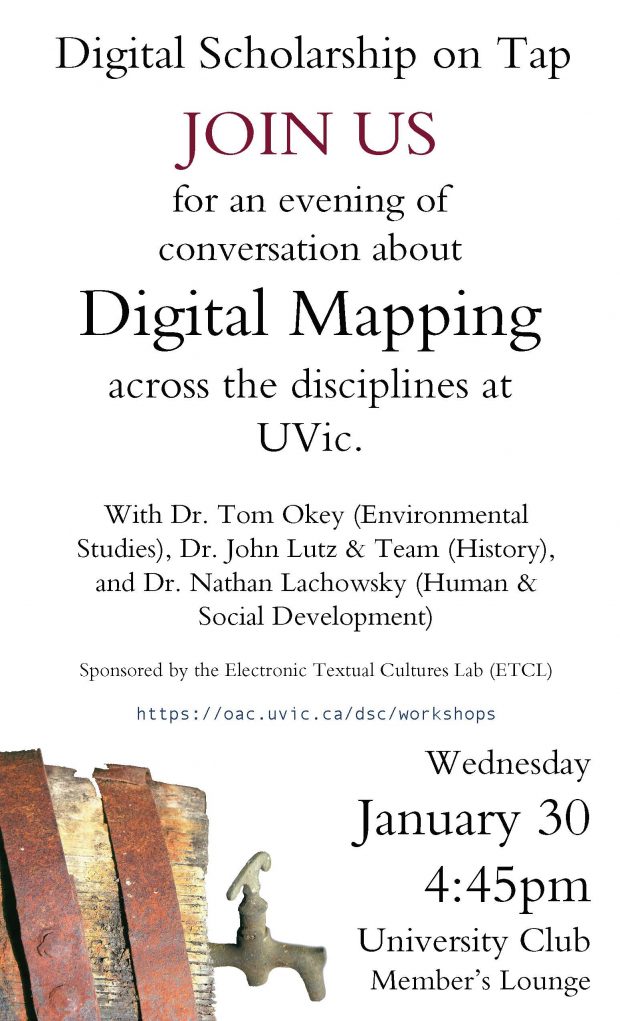[et_pb_section fb_built=”1″ _builder_version=”3.22″][et_pb_row _builder_version=”3.25″ background_size=”initial” background_position=”top_left” background_repeat=”repeat”][et_pb_column type=”4_4″ _builder_version=”3.25″ custom_padding=”|||” custom_padding__hover=”|||”][et_pb_text _builder_version=”3.27.4″ background_size=”initial” background_position=”top_left” background_repeat=”repeat”] The Electronic Textual Cultures Lab at the University of Victoria is hosting a new interdisciplinary lecture series, Digital Scholarship on Tap. This gathering is meant to bring together faculty, students, and staff across campus in a collegial atmosphere to discuss developments in digital scholarship, research, and teaching in our increasingly cybernated world. Scholars from different fields will come together to share their take on a chosen topic in a variety of formats, including panels, interviews, debates, round tables, and lectures, after which the floor will be open for discussion.
The Electronic Textual Cultures Lab at the University of Victoria is hosting a new interdisciplinary lecture series, Digital Scholarship on Tap. This gathering is meant to bring together faculty, students, and staff across campus in a collegial atmosphere to discuss developments in digital scholarship, research, and teaching in our increasingly cybernated world. Scholars from different fields will come together to share their take on a chosen topic in a variety of formats, including panels, interviews, debates, round tables, and lectures, after which the floor will be open for discussion.
Our next topic is “Mapping Across the Disciplines.”
Wednesday, 30 January, 4:45pm-6:00pm (1hr talk + drinks)
University Club: Member’s Lounge
The format will follow an interview-style discussion of different disciplinary applications of digital mapping.
Speakers are (in alphabetical order): Drs. Nathan Lachowsky, John Lutz, and Tom Okey (Bios below).
Come discuss digital technologies and research in our community!
Best wishes,
Randa El Khatib and Matt Huculak
Speaker Bios:
Dr. Nathan Lachowsky is a social and behavioural epidemiologist with 10 years of experience conducting community-based research on sexual health and HIV/AIDS with marginalized communities across Canada and New Zealand. He currently works as an Assistant Professor in the School of Public Health and Social Policy at the University of Victoria. He is a Michael Smith Foundation for Health Research Scholar and Research Director for the national Community-Based Research Centre. He conducts interdisciplinary research within a social justice framework in order to achieve health equity for marginalized communities. Nathan has volunteered with HIV/AIDS and LGBTQ+ community organizations for over a decade and currently serves on the Board of Directors for the Health Initiative for Men. Nathan will discuss two community-based research projects. The first is an oral history project focused on the onset of HIV/AIDS in British Columbia. The second is a community mapping initiative with lesbian, gay, bisexual, queer, trans, and Two-Spirit people (LGBTQ2+). We attended LGBTQ2+ Pride festivals across Vancouver Island and on Salt Spring Island to conduct a participatory mapping activity that identified resources, services, and harmful spaces for these communities.
Dr. John Lutz is an Associate Professor of History at UVic. Dr. John Lutz is popularizing the history of the Pacific Northwest. Through an innovative weave of traditional historical research, community-based fieldwork and popular interactive websites, Dr. Lutz sheds new light on settler-Aboriginal relations in the area. Dr. Lutz works in the Department of History at the University of Victoria where he teaches courses such as “The Social History of the Automobile” and “Ten Days that Shook the World.” Of the many website projects that he directs or co-directs, the most popular is Great Unsolved Canadian Mysteries, a site that invites students to “solve” mysteries plucked from Canada’s rich history while developing their research skills. The site is used in high school and university classrooms across Canada and has about 200,000 unique visitors a year. Dr. Lutz’s main research area is First Nations and settler relations in Canada. He is the author of the award-winning book Makuk: A New History of Aboriginal-White Relations. Every two years Dr. Lutz teaches an ethnohistory field school. A group of UVic graduate students live with the Sto:lo First Nation in the Fraser Valley for a month and research topics the community is interested in. Dr. Lutz says theirs is the only ethnohistory field school in Canada. Dr. Lutz’s ultimate goal is to make Canadian history engaging, accessible and exciting for students and the general public.
Dr. Tom Okey is an Adjunct Professor in the UVic School of Environmental Studies and Principal of Ocean Integrity Research. His work has generally focused on understanding the effects of climate change and other stressors on marine ecosystems. He is the coordinator of the Local Environmental Observer (LEO) Network in British Columbia, in association with the First Nations Health Authority. As part of a National Geographic research grant, Dr. Okey is partnering with secondary school teachers and students to implement a learning unit entitled, ‘A student-elder partnership for understanding ecosystem change’. The Local Environmental Observer (LEO) Network (leonetwork.org) is a global community of citizens and experts documenting unusual environmental change, understanding those changes, and finding solutions. It features a growing online database of quality-assured first-person observations that can be queried topically, geographically, and temporally. The LEO platform also includes a layer of geocoded news articles about unusual environmental change. The layer of geocoded scholarly literature is not yet populated, and LEO developers are hoping to find a somewhat automated way to geocode scholarly literature on select topics of environmental change.
[/et_pb_text][et_pb_post_nav prev_text=”%title” next_text=”%title” _builder_version=”4.4.7″ global_module=”4392″][/et_pb_post_nav][/et_pb_column][/et_pb_row][/et_pb_section]
